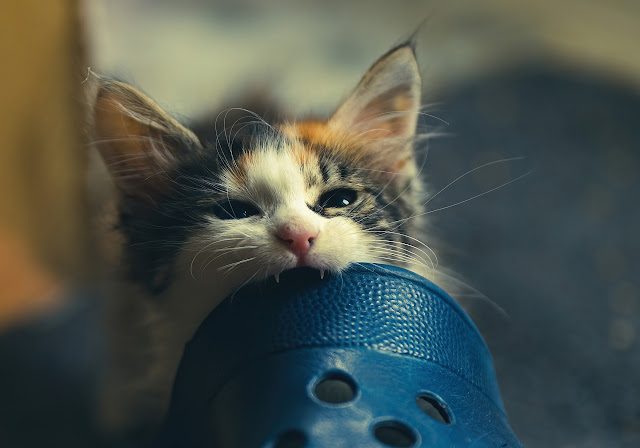So your cat has begun biting you? Or has she always been a biter but it's just getting worse now? Well, either way, you're probably wondering why she does that and how to stop her from doing it. I'm going to give you some tips on what might be causing this behavior as well as show you some methods on how to stop her.
I know that this might be frustrating for you, especially if it's never happened before. But your cat doesn't mean to hurt you. She just wants your attention and communication. And by biting she's showing you what she wants, but in an aggressive way because she can't speak or understand English (or whatever language you speak). So let's get into it.
What might be causing your cat to bite
There are a few reasons why a cat bites her owner, and a lot of them have to do with how she was raised as a kitten. It might seem counter-intuitive, but the best way to stop this behavior is by getting another kitten or young cat. I know you probably don't want to go through the trouble of making another cat, but if this behavior is really getting on your nerves there's no other way.
Let's take a look at some reasons why your cat bites:
Your Cat trying to play
Sometimes she might be playing too roughly with you and it doesn't seem like she's playing. But cats are very resilient animals, so even though it might look like she's attacking you she might just be trying to play. Instead of acting scared or putting your hands in front of you (more on that later) try to play along with her game. Then eventually move away when she gets too excited.
Your cat may be stressed
Being in a new place or around new people can stress your cat out. They don't know how to react, so they lash out by biting you. This is why it's important to get another kitten for this problem because cats stay with their moms until they're 6 months old. During that time they're learning how to be a cat and what limits there are.
Your cat feels threatened
This one is similar to the stress problem, but it's more extreme because she's actually feeling threatened by you. Start with getting another cat for this one as well.
How to stop your cat from biting
1. Visualize yourself as a cat
You can't stop a dog from biting, so you surely can't stop your cat from doing it. You need to understand that your house is now their house and they own the place. Their furniture is meant for them and not for you, just like how your things are yours and not theirs. If you don't understand that, you will face problems like biting.
2. Understand why cat bites
You might wonder why your cat bites when you play with it? Well, cats are animals and they don't know about games; they live in the moment. If they see something moving, this is what will catch their attention at that moment. Cats are predators, so their instinct will be to hunt down anything that's moving.
3. Know why cats love biting
You might also wonder why they bite during cuddles or when you pay too much attention to them? Well, it's time you understood why your cat loves biting. Cats like to play with things and people with their claws and teeth. It's a part of their hunting instinct, where they try to play with the prey as much as possible before they actually kill it.
4. Stop them from biting during cuddles
You can't stop your cat from playing with your feet even when you are trying to sleep or something important on TV, right? So make sure you get your cat its own toys so that it doesn't bother you while you are busy with something or trying to sleep.
5. Give them distractions
Make sure they have enough of their own things so they don't pester you while you are doing your work or watching TV. Provide them with some interesting toys before you start the daily household work so that they don't bother you while you do your things.
6. Prevent them from biting when they get excited
Cats often get excited when there is a lot going on in the house, so try to make sure that's under control to prevent them from doing their thing: biting and scratching. When your cat gets all enthusiastic about the housework, try to give them their own space so they don't get all excited.
7. Don't provoke your cat
Do not tease your cat because it will think you are playing and get excited. This can often lead to a serious bite if the excitement reaches its peak. Some cats love being petted on their chin or under their neck while some hate it. But one thing is for sure, you should never tease your cat while doing these things because they don't understand the meaning of this behavior and will attack out of excitement.
8. Stop them from biting by yelling at them
You need to yell at them if they have harmed you with a bite so that they understand the meaning. Yelling at them will make sure that they won't do it again and it's a sign of dominance if you want to be the top cat in the house.
9. Use deterrents like bitter apple spray
You can use deterrents like bitter apple spray to prevent your cat from biting you or others even when they get excited. It will let them understand that they should not bite, which is a good way to stop biting problems in cats.
10. Be patient and don't get mad at the cat
You need to remember that this is natural for your cat so it's not their fault if they have bitten you or anyone else in the house. So try to be patient and never get mad at them because that will make things worse. You can also use some techniques like the ones mentioned above in this article to prevent your cat from biting.
Conclusion
Your cat may be cute when she is tiny, but like children, cats too can grow into teens who become more difficult to handle. You may find yourself constantly reprimanding your cat for things that she has never done before in the hope of getting her to behave in a way that pleases you. Your attempts could range from gentle requests right up to physical violence.
If you feel like you are constantly fighting with your cat, it might be time to seek professional help and advice from a pet behaviorist or your vet.



